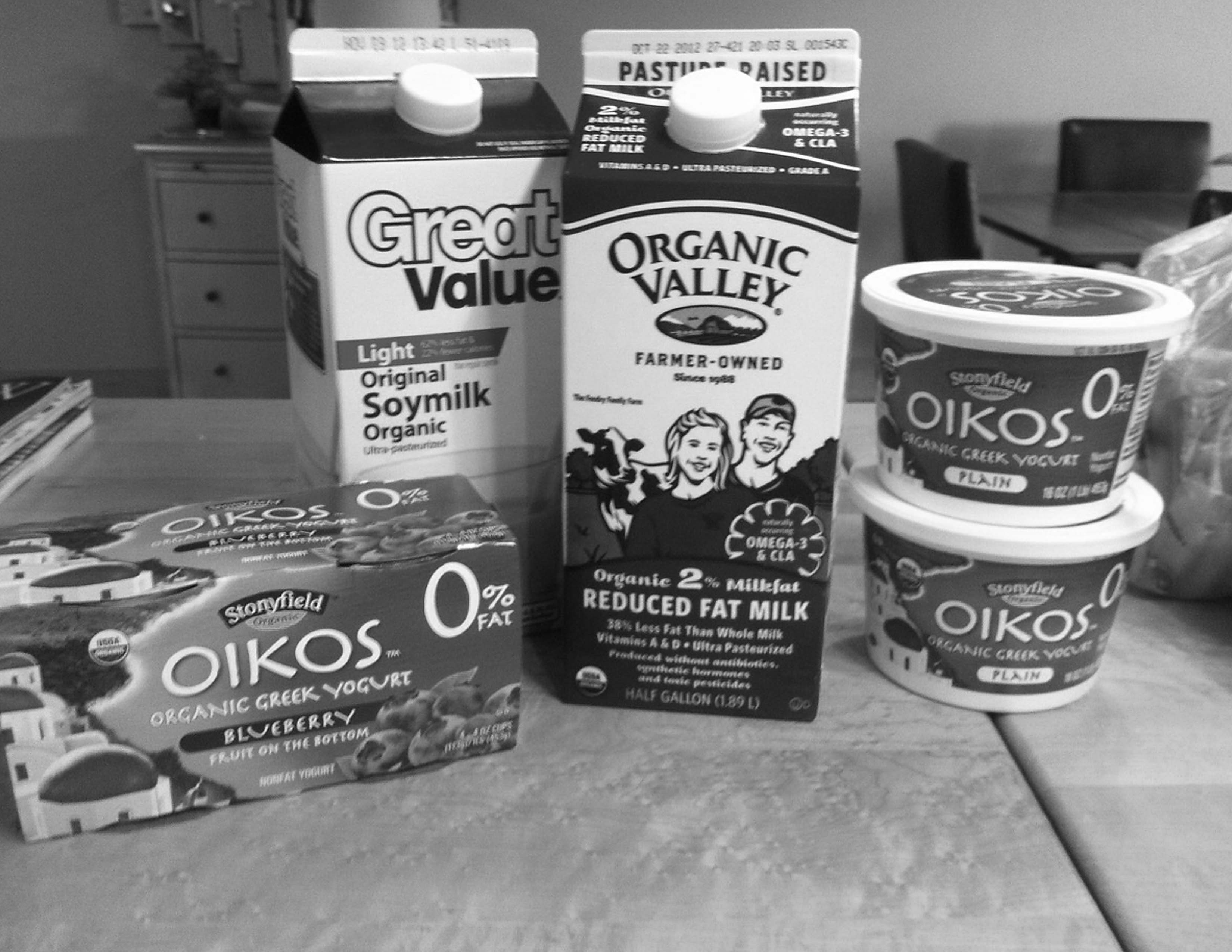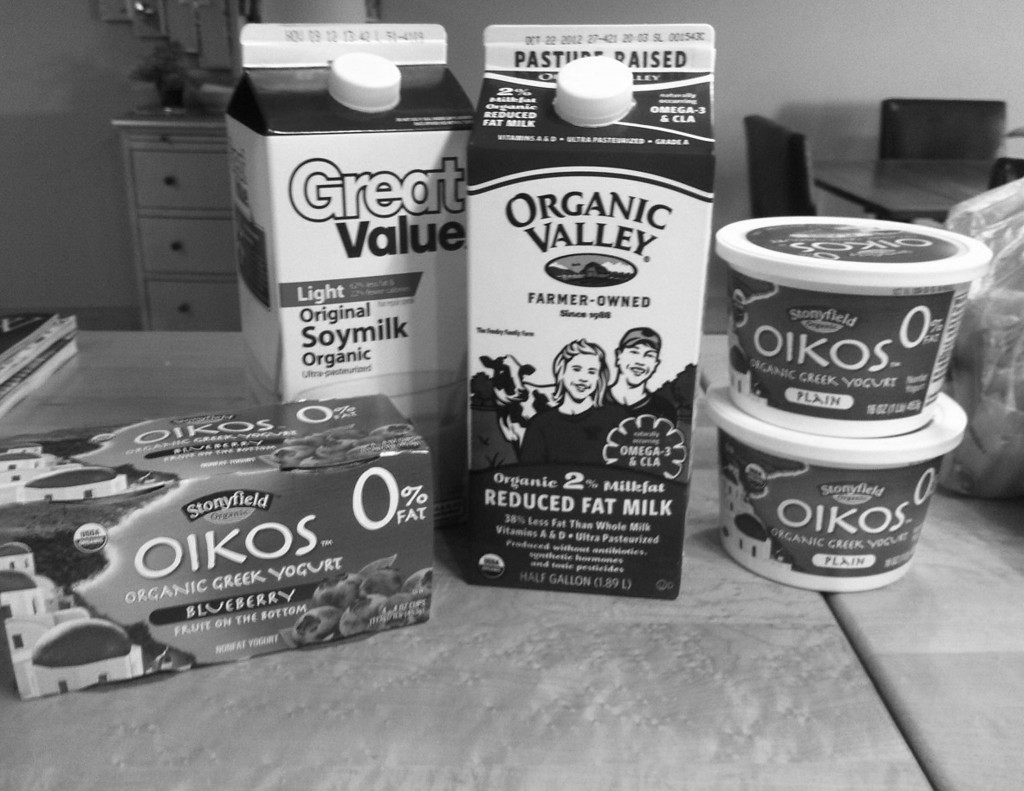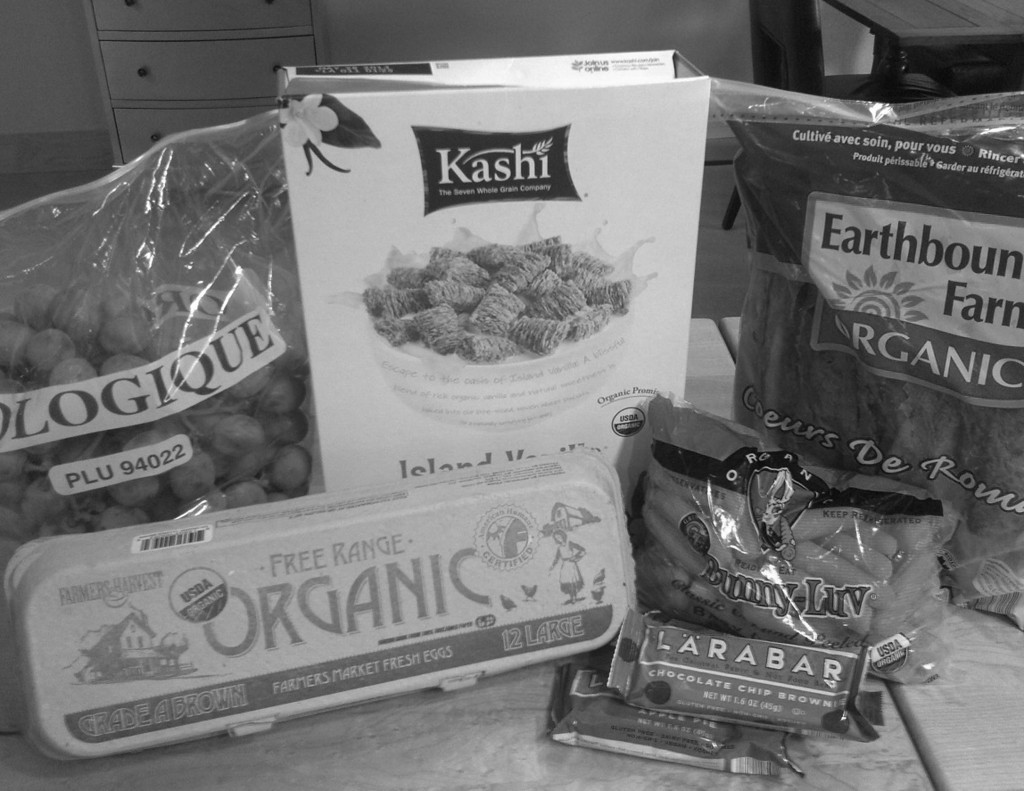Typically, I pride myself on being a pretty good grocery shopper. Although Joe and I spend a decent amount of money on groceries each week ($100/wk), I like to think that it’s a pretty great bang for our buck considering the quality and healthfulness of the items we purchase. Each Saturday morning, I sit with my computer and compare the sales fliers of the two local grocery stores we shop at (HyVee and Fareway for you Midwesterners) to decide what I will buy where. It’s an amazingly effective strategy that saves us a lot of money. And unlike coupon clipping, I find it really fun to browse the store fliers.
Of course, most of the time the produce and other items on sale are not for organic products, but rather the more conventionally-raised and grown items, so that is what we eat by default. And while I’ve always felt a pull toward wanting to purchase more organic food, it’s always seemed so expensive to do so. This week, I decided to do a little experiment. When possible, I was going to purchase organic fruits, veggies, dairy and other weekly staples to see how our grocery bill stacked up against a week when we didn’t purchase anything organic.
I assumed that it would be easy to find organic equivalents of all my typical weekly staples. Boy was I wrong! It turns out that finding organic food in the small-ish town that we live in was much harder than I imagined. I soon realized that it wasn’t going to be possible for me to buy 100% (or even close to it) organic food items, so I decided to settle for what I could find.
Since Joe and I eat a lot of dairy in the form of Greek yogurt and milk, finding organic diary items was my first priority. Some studies say that the hormonal impact of organic dairy is less than that of conventional dairy products, and that organic milk has lower levels of omega-6 fatty acids (believed to be harmful to the heart in large amounts) and higher in heart-healthy omega 3’s.
Where matters of produce are concerned, I decided to focus on buying organic items from the dirty dozen list, a compilation of the food that contain the greatest amount of pesticide contamination. I knew we would have very little chance of finding organic equivalents for every item we wanted to buy, and I was right. It was incredibly difficult!
Items Purchased:
*Free-Range Organic Eggs ($3.08)
*1/2 Gal. Organic Light Soy Milk ($2.67)
*1/2 Gal. Organic 2% Milk ($3.58)
*2 (16-ounce) containers organic plain 0% Greek yogurt ($3.98/each)
*1 (4-pack) organic flavored Greek yogurts ($3.98)
*Kashi Organic Island Vanilla cereal ($3.00)
*Organic hearts of romaine lettuce ($3.68)
*2 lbs. organic green grapes ($5.60 – $2.68/lb)
*Organic baby carrots ($1.48)
*3 Lara Bars ($2.50 total)
As I look back at the list and prices of the items we purchased, it seems really expensive to me! Surprisingly, we managed to stay within a few dollars of our weekly grocery budget and had plenty of food to eat throughout the week. Surprising, right? I’m not sure if I unconsciously compensated for the more expensive items, but I didn’t feel like we ate less or lower quality food than usual. I’ll have to give it another couple weeks to see if this was just a fluke.
Let me also take a minute to say that I agree that the cost/benefit ratio for organics is very mixed, and I myself am undecided on how I feel about organic vs. conventional methods of farming. Since I like to err on the side of caution, organics appeal to me because I like to know the impact the things I’m consuming have on my body. Do the chemicals and hormones used in traditional farming practices have a negative impact on our health? I’m not entirely sure. Do I think that it’s practical (and affordable) to think that we can feed the world’s population with organic food? Not really. Food choices are a very personal thing, and how each one of us chooses to spend our food dollars is a matter of personal preference. I’m largely undecided on how I feel about organics and what is right for our family based on health and our current budget. It’s interesting, and eye opening, to experiment with purchasing organic food, and I anticipate that I’ll continue to try and find the balance that is right for us over the weeks and months to come.
That said, I’m curious to hear what you all think. Do you think it’s worth the extra money to purchase organic food? What items, if any, do you always make an effort to purchase organic?
Madison



